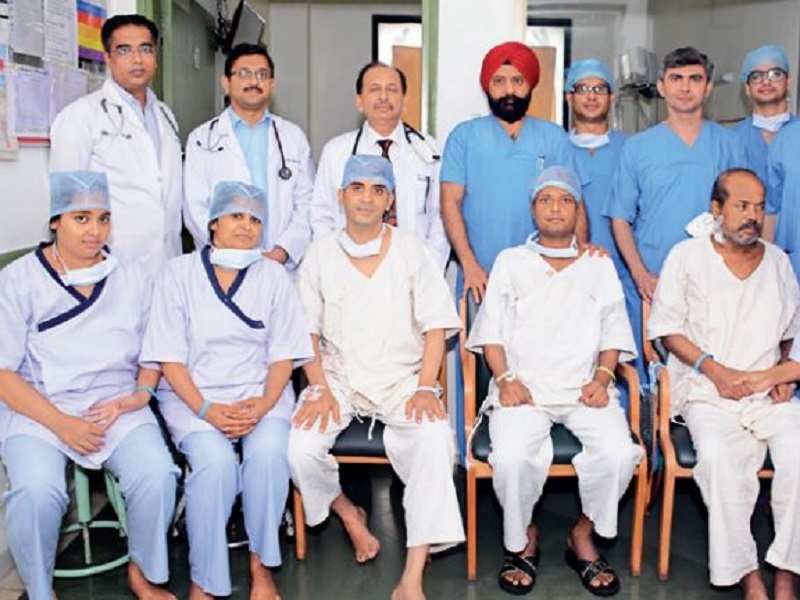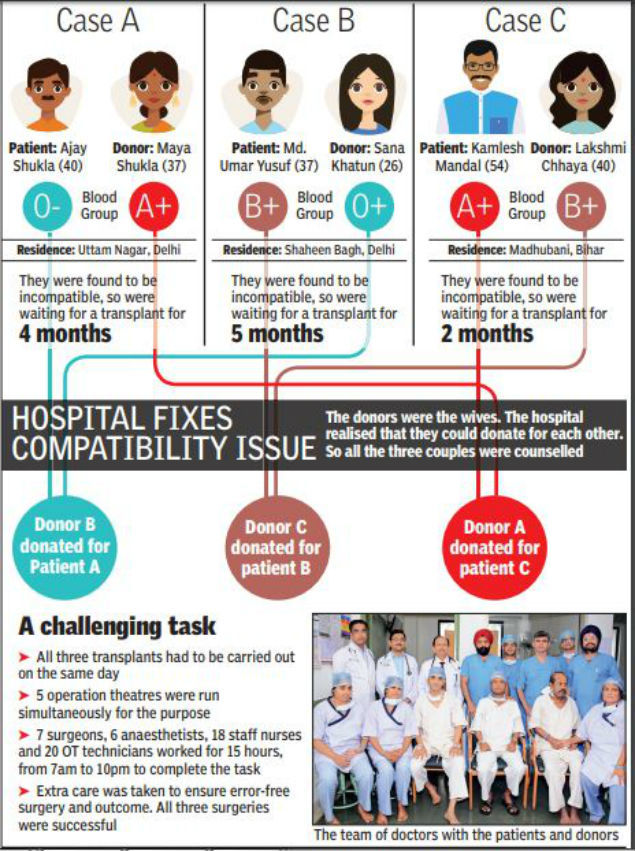 The team of doctors with the patients. Image courtesy: Times of India.
The team of doctors with the patients. Image courtesy: Times of India.
When three couples landed for kidney transplants at the Pushpawati Singhania Hospital and Research Institute (PSRI) in south Delhi, little did the doctors know that they are going to confront a tricky situation. All the three men of the couples had failed kidneys and their wives were ready to donate their kidneys. But the tests found them incompatible to donate!
Though the women couldn’t donate kidneys to their husbands, to their surprise, doctors discovered that the three women could separately donate their kidneys to those men. They have been waiting for months to find a suitable donor but in vain. When the doctors explained the situation to them, they agreed and once, the six concurred the transplants were carried out. Ajay Shukla was diagnosed with kidney failure in March. His wife, one of the donors, Maya Shukla says that they’ve approached everyone from the chief Minister to PMO for financial assistance for the transplant. Eventually, the doctors suggested swapping organs with another couple. She added.
The second recipient Yousuf learned about his failing kidney when he sought a medical certificate to get a work visa to Dubai. Since his blood showed a high level of antibodies, he couldn’t go through an incompatible transplant. He says he would’ve died if this transplant hadn’t taken place in time.
Kamlesh Mandal, a government employee in Bihar were waiting for a cadaver donor or a live donor for two months. But then the hospital told him to find his own match.
 Image: Times of India.
Image: Times of India.
Though the doctors succeeded in discovering the possibility of cross donation of organs between the three couples, conducting three concurrent transplant operations wasn’t an easy procedure. Dr. P P Singh, the director, and head of kidney transplant surgery at Pushpawati Singhania Hospital and Research Institute told Times Of India that five operation theatres were reserved for the marathon surgeries, which involved retrieving the kidneys from the donors and transplanting them into the three recipients. “Our kidney transplant unit only has two Operation Theatres, so we utilized the OTs of the orthopedics, neurosurgery and cardiac divisions” Dr. Singh added. He also explained why it had to be a simultaneous operation. He said “What if the other donor backed out later or developed health issues and couldn’t donate the organ? Also, there is up to 5 percent chances of graft rejection. In case of such things happening, the other donors have felt cheated.”
The surgery, which had been conducted on July 8th took nearly 14 hours to get completed. Seven surgeons, six anesthetists, 18 staff nurses and 20 OT technicians together performed their roles in the procedure.
According to Dr. P P Singh, “A major limiting factor in conducting kidney transplants in India is the lack of adequate donor pool”. The kidney swap programme not only makes more kidneys available but also makes them available earlier than otherwise.” He also adds that in a country like India, the expense involved in the antibody removal protocol in incompatible kidney transplants is very high, as is the risk of Infection.
PSRI claims that they keep a record of all potential donors turned down for incompatibility. And they also add that If they come across a case where swapping is possible, they advise the two groups accordingly.
All three transplants were a success and all six donors and recipients have since been discharged.
EXCELLENT JOB….